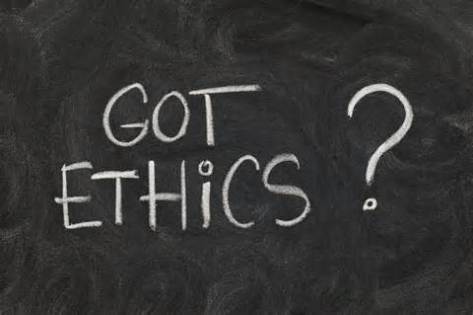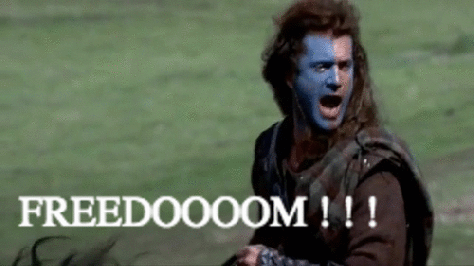
Photo reference: http://lindsayolson.com/pr-ethics-an-oxymoron/
Reference: Ethics from rupaleeslideshare
In case there is technical errors, please view the slides here
The rapidly evolving nature of new media technologies in the 21st century has resulted in a transformation of the way human beings initiate and/or maintain almost every type of ethically significant behavior. With this, now, we see a complex web of interactions between internet users, network developers, companies, government agencies and other entities. This interaction is sometimes underscored by diverse and conflicting motives and of these stakeholders. Hence, there are ethical implications ( Reference : Vallor, 2015)
The freedom to be “Who I want to be online”, becomes an ethical issue
Freedom Of “Who I want to be” online

Media Reference: http://giphy.com/gifs/freedom-braveheart-musical-theater-6901DbEbbm4o0
Video reference: A Powtoon to show the effect of too much freedom done by me.
Please view the video in “full screen” for better clarity.
Online behavior that is left unchecked, often leads to abuse. It can occur when governance is laced. Good governance serves as a checkpoint
Whatever is expressed online can now be read by millions globally. Similarly, the internet has also become a platform for anyone who wishes to voice his thoughts, right or wrong, to seek a world audience, from one as young and vulnerable as a few years old, to another, much older and wiser and who knows right from wrong.
There must therefore be some guidelines or codes of conduct to govern what can be posted. For example, the contents on what is posted. Is it sensitive issues regarding race or religion that will hurt the feelings of a specific group? Or, making an outright demand, and making it clear that if the demand is not acceded to, dire consequences will follow. This was the case of the online group who banded themselves under “Anonymous” who would hack into websites, servers after they went online to make their demands known.
Reference link here [See this video first followed by the one below]
Reference link here
Apart from the contents, it could also be the type of language used. Is it unpolished, sexist, or even vulgar language, that would contaminate the minds of a young reader or worst still, encourage him to follow the same track ?
When there are no boundaries drawn, absolute freedom would allow one to post whatever he wishes online in whatever form of base language, or lewd pictorial illustration, for he knows there is no consequences to his behavior.
Click here to see a Prezi presentation I did about the lack of control on social media.
In conclusion, among a whole lot of issues that needed to be addressed online, I am focussing on this issue on excessive freedom of expression because I also believe this is the root cause leading to other issues such as cyber bullying and online criminal activities
Coming up with some action plan has proven to be complex as prosecutors would require time as well as cooperation from social media sites to track down the culprits. (The Guardian, 2014). But there must be a start somewhere to signal to offenders that they are no longer able to go scot free.
(440 Words)
References:
Freedom House (2016a) Internet freedom. Available at: https://www.freedomhouse.org/issues/internet-freedom (Accessed: 11 November 2016).
Wikipedia (2016b) ‘Ethics’, in Wikipedia. Available at: https://en.wikipedia.org/wiki/Ethics (Accessed: 11 November 2016).
Asher, N. and Birchmore, M. (2014) Case studies. Available at: http://roarlocal.com/maslows-hierarchy-social-media/ (Accessed: 11 November 2016).
Chaffart, R. (no date) The danger of curiosity: Ouch! Available at: http://www.sermonillustrator.org/illustrator/sermon20/danger_of_curiosity.htm (Accessed: 11 November 2016).
The Guardian (2014) Twitter abuse: Easy on the messenger. Available at: https://www.theguardian.com/commentisfree/2014/jan/24/twitter-abuse-abusive-tweets-editorial?CMP=twt_gu (Accessed: 11 November 2016).
Greenwald, G. (2014) Why privacy matters. Available at: http://www.ted.com/talks/glenn_greenwald_why_privacy_matters (Accessed: 11 November 2016).
Kelion, L. (2013) Available at: http://www.bbc.com/news/technology-24426739 (Accessed: 11 November 2016).
Kleinman, Z. (2015) Who’s that girl? The curious case of Leah Palmer. Available at: http://www.bbc.co.uk/news/technology-31710738 (Accessed: 11 November 2016).
Kwara, M. (2014) Singapore’s crime rate falls to 30-year low. Available at: https://sg.news.yahoo.com/singapore-s-crime-rate-falls-to-30-year-low-105825797.html (Accessed: 11 November 2016).
Mens rea (2016) in Wikipedia. Available at: https://en.wikipedia.org/wiki/Mens_rea (Accessed: 11 November 2016).
Ronson, J. (2015) How One stupid Tweet blew up Justine Sacco’s life. Available at : this address (Accessed: 11 November 2016).
Vallor, S. (2015) Available at: http://plato.stanford.edu/entries/ethics-social-networking/ (Accessed: 11 November 2016).
Media References:
- Amos Yee’s video
- Amos Yee newspaper article
- Ethics presentation slides
- “Got Ethics? ” Image
- GIF Image
- Anonymous Threat to Mr Donald Trump
- ABC News Video

Hi Nobu, I’ve enjoyed reading your blog post, I am impressed with your effort, especially the video you have created, something that I can learn from you. I agree with you on the part whereby you stated that some of the internet users might abuse their rights of expressing themselves and eventually led to cyber bullying and unwanted cyber threats. What do you think an individual should do to prevent themselves from falling victim to cyber attacks? What kind of preventive measures they should take to eliminate this particular ethical issue on the social media?
– Walden
LikeLike